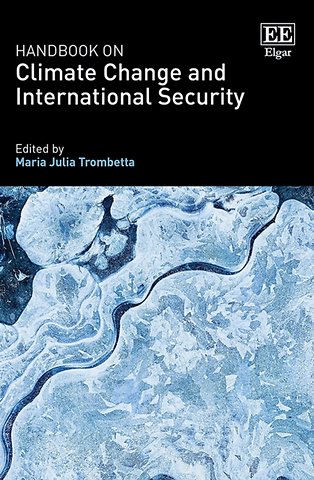Handbook on Climate Change and International Security
Samenvatting
This topical Handbook explores the emergence of climate change as an international security issue, the threats it poses, and the political and academic debates it has prompted. Framing climate change as a security issue, it explores the ways relevant actors, states and international organizations have conceptualized climate security and its associated threats.
Theoretically sound and empirically innovative, this Handbook explores the political implications of linking climate change and security and tackles the questions that are subsequently raised. Through a collection of international case studies, expert contributors explore a diverse range of issues emerging in the debate about climate change and security, including the problem of migration, the impact on energy security and the role of the military. Contributing to various discourses, logics, practices and constructions of climate security, the Handbook outlines how security language shapes and transforms the way climate change is governed. Ultimately, it identifies an emerging, broader reconceptualization of international security in the Anthropocene.
Displaying the challenges that climate change poses in the context of existing security practices and institutions, this Handbook will be vital for policymakers looking to identify and understand threats to formulate effective countermeasures. It will also prove useful to students and scholars of security studies, international relations, climate change and energy politics, environmental politics and policy, and governance.
Specificaties
Inhoudsopgave
1 Introduction to the Handbook on Climate Change and International Security 1
Maria Julia Trombetta
PART I THEORETICAL APPROACHES: TRADITIONAL AND NEW PERSPECTIVES
2 National security and climate change 16
Emilian Kavalski
3 Climate change and human security: implications for international security 32
Lorraine Elliott
4 Climate change and ecological security 49
Matt McDonald
5 Climate change, security and the posthuman 63
Stephen Hobden
6 Climate change and the transformation of security: securitization and beyond 75
Maria Julia Trombetta
7 Climate change and security in the Anthropocene 94
Simon Dalby
PART II ACTORS, INSTITUTIONS AND STRATEGIC CULTURES
8 United States: the dominance of national security and the climatisation of the security and defence sector 109
Franziskus von Lucke
9 Climate change and security: the case of the European Union (EU) 125
Judith Nora Hardt and Karlos Pérez de Armiño
10 Climate security with Chinese characteristics 142
Juha A. Vuori
11 India and climate security: domestic and international discourses 157
Dhanasree Jayaram
12 Climate change at the United Nations Security Council: securitization, climatization and beyond 180
Lucile Maertens and Maria Julia Trombetta
13 The United Nations Environment Programme, climate change and security: between functional necessity and practical rationality 199
Lucile Maertens
PART III ISSUES AND CHALLENGES
14 Climate change and military forces 216
Michael Thomas
15 Energy technology, climate change, and security in Anthropocene 235
Maximilian Mayer and Susanne Peters
16 Climate change, global health, and international security 254
Robert L. Ostergard, Jr and Nicholas Seltzer
17 Water, energy and food security nexus approach to responding to hydrological changes driven by climate change 273
Zilin Wang and Faith Ka Shun Chan
18 Re-imagining political life: beyond the climate–security–migration nexus 293
Raffaela Puggioni and Maria Julia Trombetta
19 Climate change and gender security, implications for a HUGE security 309
Úrsula Oswald-Spring
20 A thousand prudent actions for a climate-resilient future 326
Pol Bargués
21 Conclusion: climate change and international security: between securitization and climatization 342
Maria Julia Trombetta
Index







